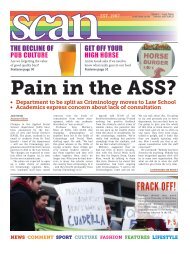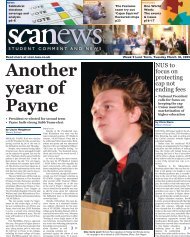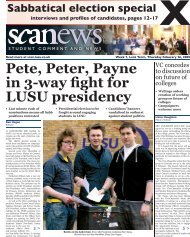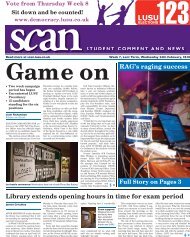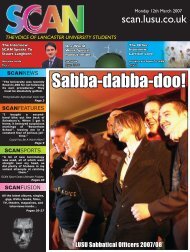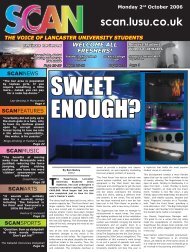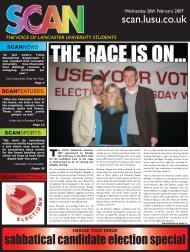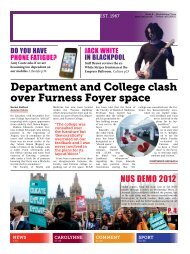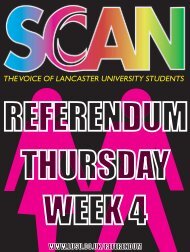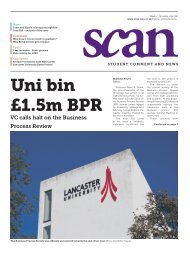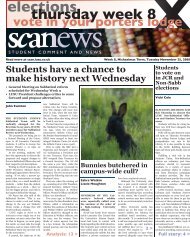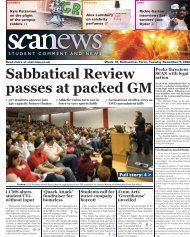Bar Wars return: Plans for Pendle Bar to only open ... - Scan - Lusu
Bar Wars return: Plans for Pendle Bar to only open ... - Scan - Lusu
Bar Wars return: Plans for Pendle Bar to only open ... - Scan - Lusu
You also want an ePaper? Increase the reach of your titles
YUMPU automatically turns print PDFs into web optimized ePapers that Google loves.
4NEWSWeek 2 - Summer Termscan.lusu.co.uk/newsInvestigation: Drink spiking at LancasterCulture of silence as studentsfail <strong>to</strong> report spiking <strong>to</strong> Police• Some students feel there is “no point” in reporting incidents• Results found through SCAN survey of over 500 studentsCatherine ChorleyNews Edi<strong>to</strong>rAn investigation in<strong>to</strong> LancasterUniversity students’ experiences ofdrink-spiking during their time herehas uncovered a culture of silence.Following reports of drink-spikingincidents posted on a LancasterUniversity student-run social mediapage, more than 500 students volunteeredin<strong>for</strong>mation in a SCANinvestigation concerning students’experiences of drink-spiking andtheir awareness of how <strong>to</strong> prevent it.One quarter of all respondents saidthat they had experienced drinkspikingwhilst on a night out, eitheras victims or as members of a groupin which someone fell victim <strong>to</strong> theoffence. The worst-affected demographic,according <strong>to</strong> this investigation,appears <strong>to</strong> be female first-yearundergraduates.It is important <strong>to</strong> stress that, of the133 incidents of spiking representedin the data collected by SCAN, allbut nine occurred off-campus. Furthermore,it would be inaccurate <strong>to</strong>report that the results obtained arewholly representative of the situationat Lancaster University. As Students’Union Vice President (Equality,Welfare and Diversity) RosaliaO’Reilly explained, “The people answeringwill be the people who havebeen spiked or know someone whohas.” As such, the percentage of respondentswith experience of drinkspikingmay not translate <strong>to</strong> anequivalent percentage of the overalluniversity population.However, the data do show a worryingtendency <strong>for</strong> those affectedby spiking incidents not <strong>to</strong> reporttheir experiences <strong>to</strong> the authorities.Of the 133 incidents recorded in thesurvey, <strong>only</strong> six had been reported<strong>to</strong> the police. Only one respondentanswered that their report had been“satisfac<strong>to</strong>rily resolved” by the police.This report rate was identified byO’Reilly as a principle concern thatshe is keen <strong>to</strong> tackle. Whilst optimisticthat “we don’t have a massiveproblem [with spiking] in the Sugarhouse,”O’Reilly nevertheless is realisticabout the impact of unreportedincidents on the authorities’ perceptionsof the problem. She candidlysummarised the issue as follows:“I have heard about spiking incidentsin the past in Lancaster, but Idon’t know that it’s a massive issue[…] It’s really hard <strong>to</strong> tell, so it’s agood thing that SCAN is doing thesurvey.”“We don’t have amassive problem[with spiking] in theSugarhouse”A recurrent concern amongst participantsin the survey was whetherthey would be believed if they didreport a suspected incident. Manybelieved there <strong>to</strong> be “no point” in reportinga suspected crime, either becausethey felt that they themselveswould be blamed “<strong>for</strong> not watching[the] drink properly” or because theywere unsure of the specifics of theirexperience and deemed the offence“impossible <strong>to</strong> prove.”It would seem that many do nothave confidence in the ability of thecriminal justice system <strong>to</strong> apprehendthe perpetra<strong>to</strong>rs and secure theirconvictions, given the uncertaintiesassociated with alcohol and drinkspiking.Often, students may <strong>only</strong> realisethat they have been spiked longafter the incident has occurred – insome cases this may be the followingmorning when the after-effectsof a night out manifest as wildly disproportionate<strong>to</strong> the amount of alcoholknown <strong>to</strong> have been consumed.However, the issue is complicatedby the difficulty an individual mayhave in recognising the effects ofdrink-spiking as distinct from thoseof inebriation through alcohol consumedof the individuals’ own volition,particularly when this consumptionhas been excessive. Oneresponse exemplified this, stating,“[I was] unsure if it was actually aspiking or if the person consumed<strong>to</strong>o much alcohol at the time.” Thisis often accompanied by the beliefthat, even if the incident is reported<strong>to</strong> the police, no progress will bemade as the victim will be dismissedas a “drunken student” or there willnot be enough evidence <strong>to</strong> proceed.One student recalled a particularlyconcerning incident: “I went <strong>to</strong> A&Eand didn’t feel the issue was takenseriously. They didn’t run any testsso there was no definite evidence <strong>for</strong>it <strong>to</strong> be reported <strong>to</strong> the police.”The most common drug used indrink-spiking is alcohol itself, whichmeans that establishing whether anoffence has been committed is mademore difficult, as <strong>to</strong>xicology screeningwill not differentiate betweenwhat was drunk intentionally andwhat was added without the drinker’sknowledge or consent. Datagathered by SCAN shows the mostcommon problem identified by thoseexperiencing drink-spiking – whichin turn impacts upon the inclination<strong>to</strong> report a suspected offence – isthat the uncertainty about where,when and by whom the victim wasspiked. Many victims stated thatthey did not realise until, in theirview, it was <strong>to</strong>o late <strong>to</strong> report. Thisfurther highlights the need <strong>for</strong> vigilanceon the part of the student andthose with whom they are partying.84%Of students who said theyhad experienced drinkspiking in Lancaster chosenot <strong>to</strong> report the incidentIn recent years, the growingpractice of ‘pre-drinking’ be<strong>for</strong>ecommencing a night out in commercialvenues may have exacerbatedstudents’ risk of being spiked,since many arrive in the city centrealready drunk. Even if they do notthink themselves in any way compromised,some students may havealready consumed enough <strong>to</strong> putthem at risk of spiking through a decreaseddegree of vigilance aroundtheir drinks, or a greater pr<strong>open</strong>sity<strong>to</strong> take risks they would nottake when sober. Police and healthauthorities recommend that thoseon a night out avoid becomingso drunk that they are unaware oftheir surroundings, since this leavesthem especially vulnerable <strong>to</strong> beingspiked. This vulnerability is <strong>only</strong>compounded by such an individual’sinability <strong>to</strong> recognise the changes intheir physical and cognitive statesthat would occur with drink-spiking.‘It is important <strong>to</strong>stress that, of the133 incidents ofspiking representedin the data collectedby SCAN, all butnine occurred offcampus’Fortunately, many students who<strong>to</strong>ok part in SCAN’s research saidthat they were aware of campaignssuch as Easy Tiger, and had beengiven safety aids such as Spikey bottle-s<strong>to</strong>ppersin the past. Yet O’Reillyacknowledged that, despite the bestef<strong>for</strong>ts of awareness campaigns,most people who habitually drink <strong>to</strong>excess are likely <strong>to</strong> continue <strong>to</strong> doso irrespective of their knowledge ofpotential risks.“If people want <strong>to</strong> go out and getdrunk, they are going <strong>to</strong> go out andget drunk. It’s just sad that peoplethink that that’s a good time,” shesaid.Instead, she argued, the focus mustbe on limiting the risks <strong>to</strong> which youare exposed, along with the fact thatadding alcohol <strong>to</strong> a friend’s drink –even without any malicious intent –is still a crime.Previous LUSU campaigns thathave proved <strong>to</strong> be the most successfulare those which focus on helpingstudents <strong>to</strong> retain some degree ofhow much they are drinking withouttelling them <strong>to</strong> s<strong>to</strong>p al<strong>to</strong>gether orgiving them lists of safety tips ofwhich they are already aware. Freshers’Week saw EWD campaignershand out Easy Tiger glasses markedwith unit measures, which O’Reillydescribed as a positive way <strong>to</strong> showpeople how they can keep an eye onhow much they are drinking withouttelling them, “Don’t drink!”



